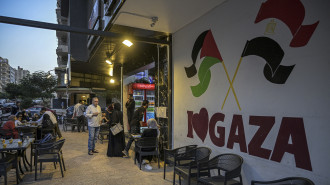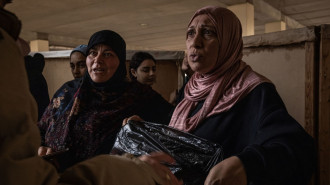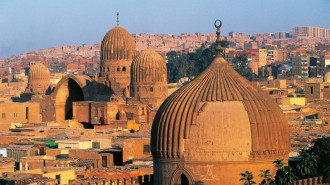Banksy unveils new artwork in support of jailed Turkish artist Zehra Dogan
The famed graffiti artist's 20-metre-long work features a series of tally marks such as those prisoners use to keep track of the time behind bars.
One of the them doubles as the bars of Dogan's cell from which she peers out.
"Free Zehra Dogan" appears in the bottom right corner of the mural, located at the busy crossroads of Houston Street and Bowery.
Dogan was put behind bars after she painted a gloomy picture of the Kurdish-majority town of Nusaybin in southeastern Turkey, which suffered heavy damage during a Turkish military operation in 2016.
"Sentenced to nearly three years in jail for painting a single picture. #FREEzehradogan," Banksy wrote in an Instagram post accompanying the mural.
Dogan, a native of Diyabakir in southeastern Turkey, is also well known for her work as editor of Jin, a Kurdish news website staffed entirely by women.
Twitter Post
|
She was arrested in July 2016 in a Nusaybin cafe. In her subsequent hearing, witnesses testified that she was a member of an "illegal organisation", despite being registered with the state and a member of the Union of Journalists of Turkey.
Her paintings and social media posts were used as evidence against her by the prosecution.
She was eventually sentenced to two years, nine months and 22 days for "posting a painting to social media", according to rights group Voice Project.
Twitter Post
|
"I was given two years and 10 months [in jail] only because I painted Turkish flags on destroyed buildings. However, they [Turkish government] caused this. I only painted it," Dogan tweeted after the sentencing.
"Art and paintings can never be used in such a way," said Dogan's lawyer, Asli Pasinli. "This is an attack on art and artistic expression."
Turkey has long been waging an offensive against the rights of its Kurdish population. The failed 2016 coup has also led to a large-scale constriction of press freedoms, with many high-profile writers and journalists imprisoned.
The "Bowery Mural Wall" on the edge of the East Village has hosted some of the biggest names in graffiti since the late 1970s. Banksy's work was preceded by one by artist Lakwena.
Banksy also revealed a second Manhattan work in recent days: picturing a rat - one of the artist's signature motifs - running inside the face of a clock on a building slated for demolition, at the intersection of Sixth Avenue and 14th Street.
The identity of Banksy, whose politically provocative graffiti appears suddenly and mysteriously on walls around the world, remains unknown despite frequent attempts to uncloak the secrecy.
Agencies contribute to this report.

![Palestinians mourned the victims of an Israeli strike on Deir al-Balah [Getty]](/sites/default/files/styles/image_684x385/public/2024-11/GettyImages-2182362043.jpg?h=199d8c1f&itok=xSHZFbmc)


![The law could be enforced against teachers without prior notice [Getty]](/sites/default/files/styles/image_684x385/public/2178740715.jpeg?h=a5f2f23a&itok=hnqrCS4x)
 Follow the Middle East's top stories in English at The New Arab on Google News
Follow the Middle East's top stories in English at The New Arab on Google News


